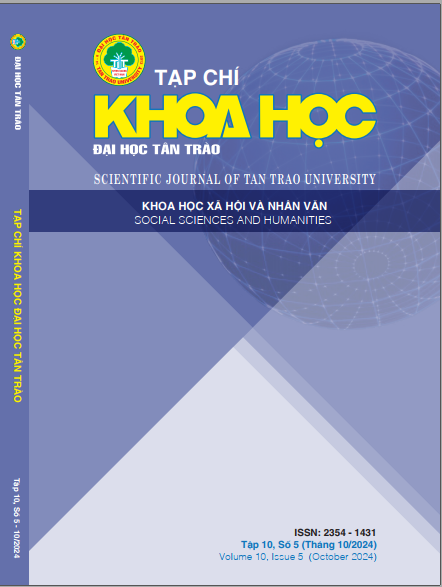I AND THEY (MÌNH VÀ HỌ) OF NGUYEN BINH PHUONG AND PARANOIA (HOANG TÂM) OF NGUYEN DINH TU - PERPECTIVES FROM WAR OBSESSIONS
DOI:
https://doi.org/10.51453/2354-1431/2024/1272Abstract
The literature on the topic of border wars (including the Northern Border War and the Southwestern Border War) is an important part that contributes to shaping the landscape of modern Vietnamese literature. In this article, we explore the war-related obsessions in two representative novels of this literary genre, Mình và họ (Nguyễn Bình Phương) and Hoang tâm (Nguyễn Đình Tú). Drawing on insights from psychoanalytic theory, we delve into the obsessions with the crimes of war, the loneliness of individuals during and after the war. Through this analysis, we gain a deeper understanding of issues related to human existence, spiritual life, and the relationship between the individual and society, as portrayed by the authors through their character representations.Downloads
References
Lai Nguyen An, 150 Literary Terms, Hanoi: Văn học Publishing House, 2017.
Nguyen Van Luy and Le Quang Son, Psychology Dictionary, Hanoi: Vietnam Education Publishing House, 2009.
Nguyen Binh Phuong, Mình và họ (I and They), Ho Chi Minh City: Trẻ Publishing House, 2019.
Nguyen Dinh Tu, Hoang tâm (Paranoia), Ho Chi Minh City: Hội Nhà văn Publishing House, 2013.
Phan Tuan Anh, Modern Vietnamese Literature - From Comparative Perspectives, Ho Chi Minh City: Văn hóa Văn nghệ Publishing House, 2018.
Sigmund Freud, The Ego and the Id, Hanoi: Tri thức Publishing House, 2016.
Vu Thi Trang, Psychoanalytic Criticism - The Realm of Artistic Obsessions, Hanoi: Khoa học Xã hội Publishing House, 2020.
Van Thi Phuong Trang, “Vietnamese Novels in the Early 21st Century from a Psychoanalytic Perspective”, Doctoral Dissertation, University of Sciences, Hue University, 2016.
Downloads
Published
How to Cite
Issue
Section
License

This work is licensed under a Creative Commons Attribution-ShareAlike 4.0 International License.
All articles published in SJTTU are licensed under a Creative Commons Attribution-ShareAlike 4.0 International (CC BY-SA) license. This means anyone is free to copy, transform, or redistribute articles for any lawful purpose in any medium, provided they give appropriate attribution to the original author(s) and SJTTU, link to the license, indicate if changes were made, and redistribute any derivative work under the same license.
Copyright on articles is retained by the respective author(s), without restrictions. A non-exclusive license is granted to SJTTU to publish the article and identify itself as its original publisher, along with the commercial right to include the article in a hardcopy issue for sale to libraries and individuals.
Although the conditions of the CC BY-SA license don't apply to authors (as the copyright holder of your article, you have no restrictions on your rights), by submitting to SJTTU, authors recognize the rights of readers, and must grant any third party the right to use their article to the extent provided by the license.


